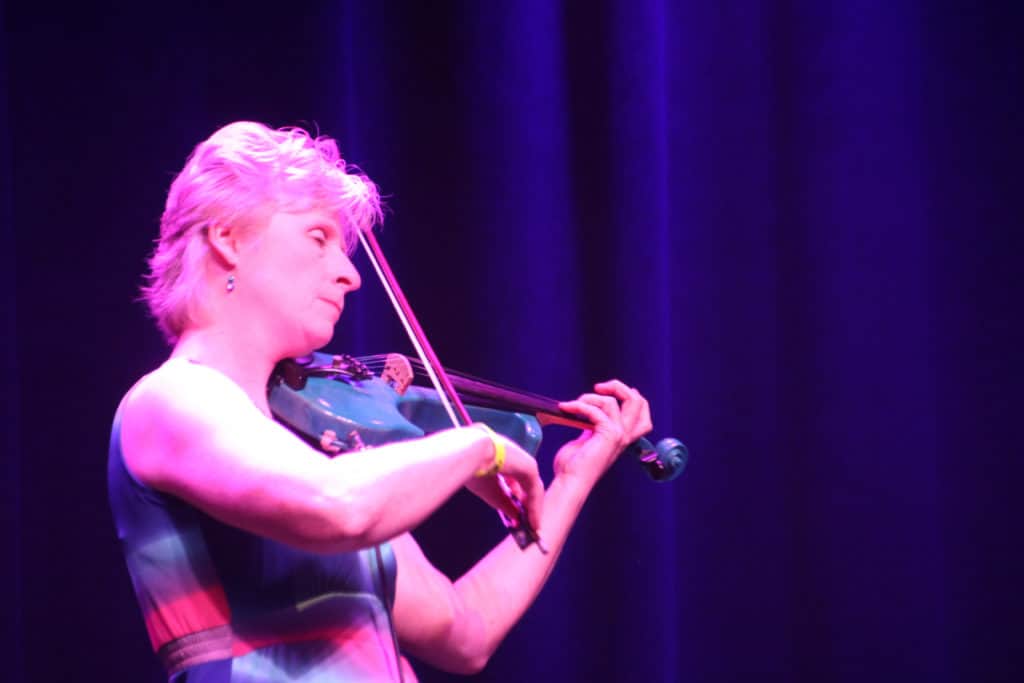
Swallow Hill Instructor Josie Quick plays her violin onstage during a concert. Photo courtesy Josie Quick
Swallow Hill’s Josie Quick is a relentlessly creative member of our community. A longstanding and highly regarded Fiddle and Violin Instructor, she is also a driving force behind dynamic acoustic jazz duo Perpetual Motion, visual artist, and lifelong learner.
We’ve all faced unique challenges over the last two years due to the emergence of COVID-19, and Josie is no different. While she adapted quickly to online teaching and virtual performances in 2020, in 2021 she had to contend with “potentially career-ending” injuries to both of her arms.
Josie dove into physical therapy, explored other creative avenues while she recuperated, and got back to playing violin as quickly as possible. “It’s getting better every day,” Josie told us of her progress, and she is already back to teaching and performing.
Josie filled us in on her progress, her creative process, and the benefits of practice in our latest Faces of Swallow Hill.
It’s great to hear from you. I guess first thing’s first, you sustained some pretty serious injuries this summer, but I see that you are playing your violin once more. How are you doing?
All things considered, I’m doing pretty well. For those who don’t know, at the beginning of summer, I dislocated and shattered my left elbow and broke my right hand. I had both arms in casts for almost a month, and it took three months for the elbow to heal. The doc and physical therapist both told me that I’ve done exceptionally well. I did work pretty hard at getting back to 100% as quickly as possible. It’s getting better every day.
How did you stay creative while you were on the mend?
In the beginning, I put my energy into PT, as I couldn’t do much else. I went a little stir crazy not being able to play an instrument. I tried a few things like singing and ear training, but it wasn’t the same. As soon as I could hold a mandolin I started playing some Brazilian choro music. I wrote a tune I call “The Broken Elbow Cha Cha” while I was noodling on the mandolin. I plan on putting it on our next CD.
As things have reopened to various degrees over the last year, how has your approach to teaching changed? Or has it changed at all?
Playing along with my students was a huge part of how I taught. Not being able to do that online was a real challenge at first. It motivated me to try different things. Some students improvised to backing tracks. One of my students was transcribing video game music. My classes were making music collages. When I broke my arms it made it even more challenging, I couldn’t even play for them. I had to be creative in finding ways to convey what I was after. That’s stayed with me.
Your band, Perpetual Motion, has received several honors over the last year, what’s in store for the band?
Tom (Carleno – Josie’s musical partner and husband) has started working on a solo guitar CD, and I have plans to start working on a live looping CD. We wrote some music during the pandemic, and plan to record those songs soon as well. We’re also anxious to start performing again.
What would you say to a student who loves their instrument, but is struggling to keep up practicing their instrument?
Adult students put a lot of pressure on themselves. They often think they should progress much faster than they are. I tell them it’s okay to not be good at it, that’s what I’m there for. If they got it right away, I wouldn’t have a job. Relax, and have fun.
Also, how a person practices makes a huge difference. Many people play straight through their songs over and over and don’t feel like they’re making any progress. That is discouraging. I recommend they focus on smaller chunks of music or one aspect of their playing that they’d like to improve. One tiny goal at a time. Accomplish that, you’re encouraged to try another tiny goal.
When I broke my elbow, I knew it was potentially career-ending. I also knew that it wasn’t going to stop me. I’ve had my career threatened by illness before. In 2009, I was diagnosed with lupus. I was in pretty bad shape for about a year and a half. It took another couple of years to regain my strength and stamina. I got through that by focusing on the positive. That was a lesson that served me well in recovering from this break. It wasn’t always easy, but it kept me moving forward. You can do anything if you keep focusing on the positive.
Thanks Josie!
